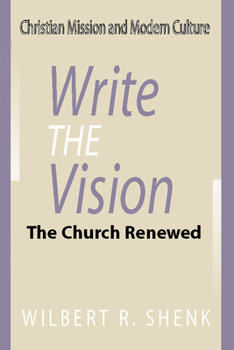Write the Vision: The Church Renewed
Shenk contends that the engagement of the church with modern Western culture resulted in the marginalization of Christian faith and the undermining of the church's integrity. He maintains that when... This description may be from another edition of this product.
Format:Paperback
Language:English
ISBN:1579106471
ISBN13:9781579106478
Release Date:May 2001
Publisher:Wipf & Stock Publishers
Length:128 Pages
Weight:0.35 lbs.
Dimensions:0.3" x 5.6" x 8.2"
Customer Reviews
1 rating
A Bold Vision A Little Smudged
Published by Thriftbooks.com User , 18 years ago
"Write the vision" is the commandment which Habakkuk received from God in Hab. 1:2. This would likewise seem to express the author's intent, namely to present a vision for the future of the Church today. Shenk describes the Church with reference to modern Western culture: "In modern Western culture . . . churches have been in a long phase of decreasing adherents and increasing cultural marginality". He further describes the Church with reference to Scripture: "In scripture the church is interpreted largely in terms of its purpose in relation to the missio Dei, whereas classical Christendom emphasized its institutional character." The one great problem with Christendom, writes Shenk, is that it "may be characterized as church without mission". One need only look at the confessions of Christendom: "all emphasize the being rather than the function of the church". With this in mind, Christians should again "learn to think about their culture in missional terms". Missions should no longer be thought of as "activities conducted beyond the borders of historical Christendom". Rather, "the sole source of renewal for the church is the missio Dei". This needs to be done with theology which penetrates a culture "as deeply as possible", and with the integrity that comes through a reorientation (metanoia) that "touches all dimensions of life". Shenk begins by delving into the history of the past few centuries, describing several failed attempts to reach our modern culture, and a few which succeeded surprisingly well, most of which faced "official ecclasiastical censure". His brief overview of John Wesley, Charles Finney, Karl Barth, Norman Vincent Peale, Billy Graham, and other names who engaged their culture (effectively or not), is one of the great strengths of this book. On the downside, perhaps there was too heavy an emphasis on Christians being "defined by their mission and task", which is decribed as their "raison d'etre". This would seem to marginalise worship in particular (in its widest sense), and its empowering role in the Church. Shenk also uses some jargon which leaves one floundering, e.g. "the reign of God", or "liberation". Such terms are used with widely divergent meanings today. Not least, much was assumed about the present reality of the Western Church, so that a non-Westerner might have some trouble forming a picture of the problem it seeks to address. All in all, Shenk takes a positive view of the position that the Western Church finds itself in today. He quotes Herbert Butterfield as saying that "we can just about begin to say that at last no man is now a Christian because of government compulsion", or because it will win an individual social or economic benefits. The Church is once again "the diaspora", "instruments of God's saving intention in this world".






